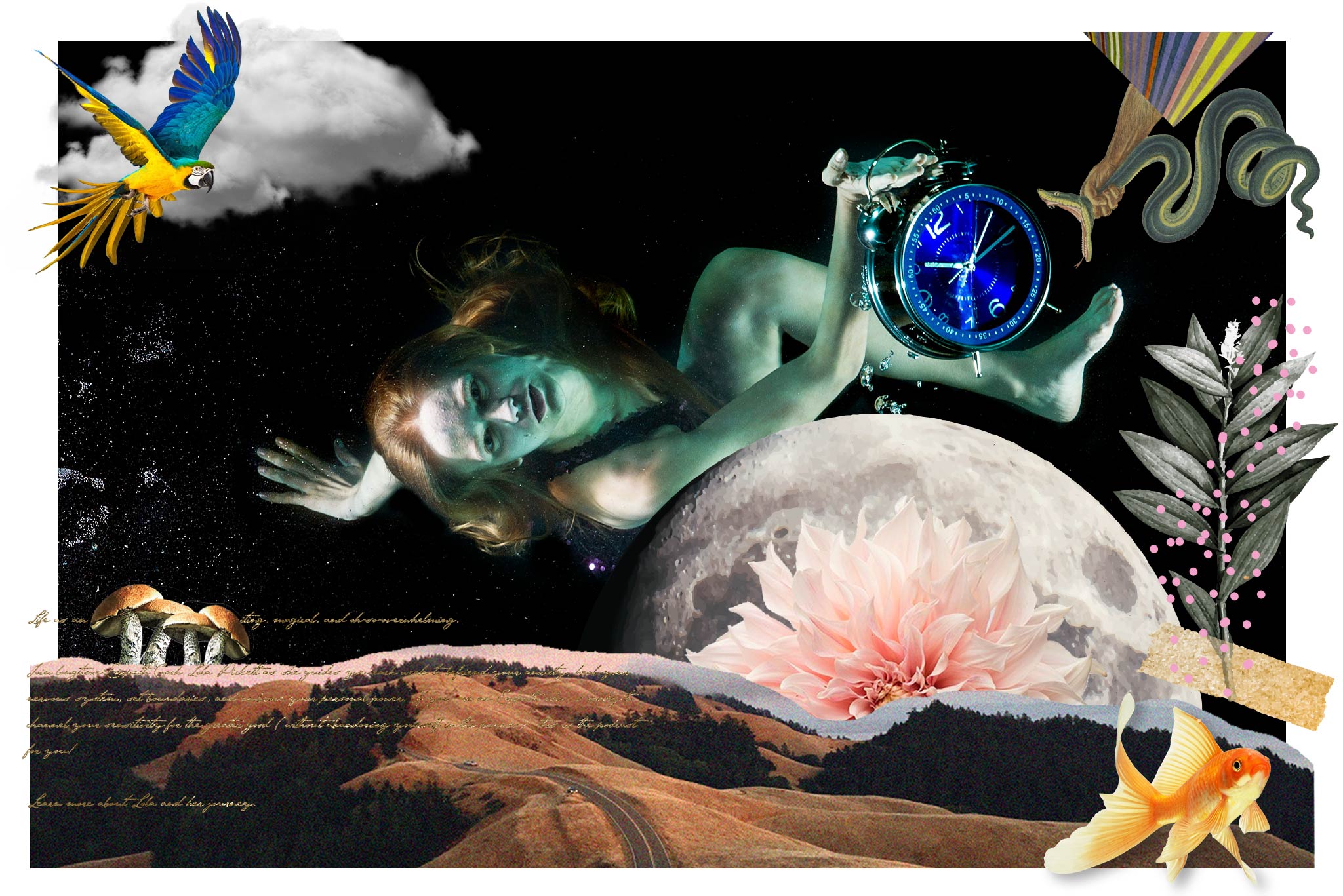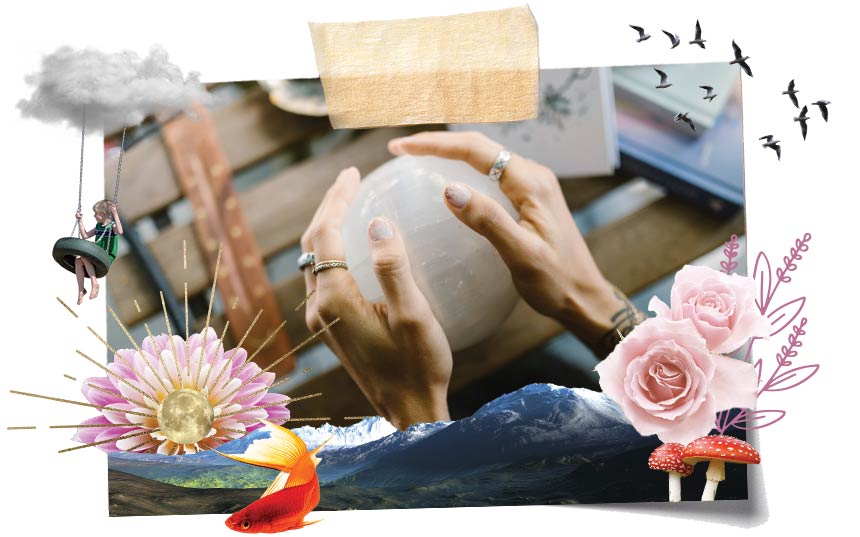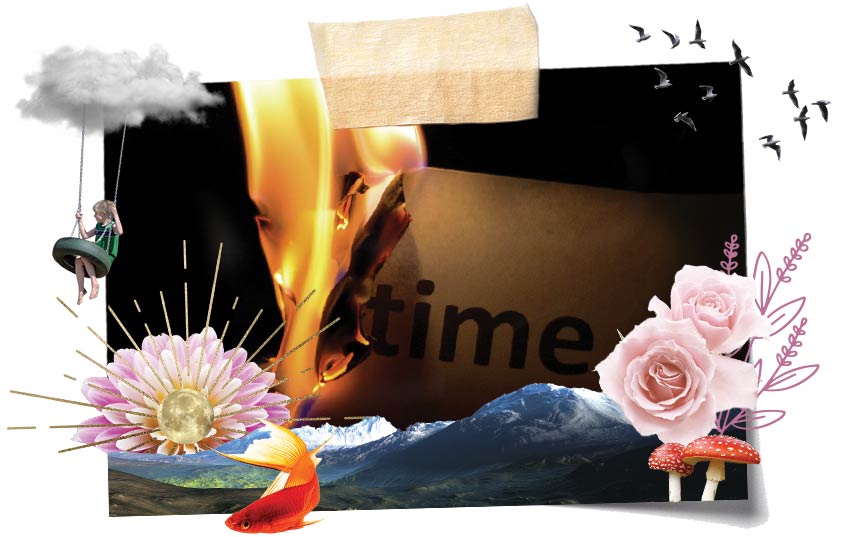Have you ever found that when you’re enjoying yourself the most, time seems to fly by? Or that when you’re most at peace, time seems to stop altogether? It seems unfair that our happiest moments tend to be bookended by the feeling of time dragging on, slow and painful and boring, just to arrive at a sweet spot that ends all too quickly.
How demotivating is that? To know that “good times” are a mere snapshot while the “bad times” feel like a poorly written film caught in a loop.
When we’re experiencing a moment of joy — a vacation, an adventure with friends, a night out on the town — the mechanics of time haven’t changed. We know that! Of course the sun still rises and sets, and the clocks keep ticking away. But our perception of who we are in that time and space — what’s available to us, what’s important to us, how we feel about it — all of that changes how much time it seems like we have.
Current research shows that how we understand time is dependent on our emotions and our sensory system. Neither of which alter our “internal clock” but affect how we perceive time. Time exists as an interpretation of our circumstances by the Central Nervous System (CNS). In other words, time exists inside of us.
We are time embodied.
To make the most of our days —to truly appreciate and play alongside time — we must change our perception.
And to do that, we must learn to view our circumstances in a more open-minded way. We must learn to bend time.
Because our Central Nervous System prioritizes information that conforms to our already programmed beliefs and expectations, having non beneficial belief systems can be damaging to our ability to manage and ENJOY time. As such, how we perceive time is not so much a reflection of time’s passage, but of the state of the beholder.
The way that we see time and the way that we use time is absolutely dependent on our state of being. Time is inherently connected to our sense of self!
So, when we’re disconnected from ourselves —our wants, our needs, our dreams, our desires — our experience of time is at the whim of our emotions and our sensory processing.
For us Highly Sensitive People, this can be especially challenging because we’re processing SO much SO often! On top of that, our propensity to give to others nearly guarantees that the way we view our time is by what it provides to ANYONE but US.
When we’ve decided that our SELVES have very little worth outside of the time we have or give, HAVING TIME becomes the goal we chase. And what happens then? It feels like there is never enough and we start pouring from an empty cup.
Managing time in a beneficial way means having BADASS boundaries. Your time is a privilege and gift — to yourself and to others. You are 100% allowed to view it as such.
It’s time to start making choices with conscious intention, knowing that the end — the “payoff” if you will — is what you’re moving toward. When you step away from decisions that focus on how much time is taken or given, and instead focus on what you receive at the end, YOU become the goal. You make an investment in YOU.
Your needs are prioritized.
Your desires are met.
Your dreams are realized.
So let’s dive into how you process information and with that, how you perceive time! I call this the Story-States Process. To learn more about these four steps and how to transform your perception, check out Episode 115 of the Moon + Manifest podcast!

THE STORY-STATES PROCESS
Tips for Time Management
INFORMATION
The Story-States Process starts by receiving INFORMATION. This information can come from data outside of ourselves (proprioception) or from within our bodies (interoception).
Information is received by our sensory neurons, and depending on which format(s) the information comes in (temporal, physical, emotional, vibrational), it then gets communicated via synapses and routed to various parts of the central nervous system for processing.
By nature, we cannot perceive all of the sensory data occurring around and within us at any given time. It’s far too much information for our Central (Brain and Spinal Column) and Enteric (Gut) nervous systems to process.
So, we only perceive the information that our subconscious mind deems as important to our safety or information that matches our expectations. The rest is filtered out by the peripheral nervous system’s sensory gates and does not get processed.
In other words, we perceive what we believe and we see what we expect to see. We amplify our body’s sensory sensitivity whenever our safety seems under threat.
There’s a popular selective attention experiment about this where an audience is asked to watch a video and count the number of times a basketball is bounced between team members.
The audience focuses, counts the bounces, and when the video ends, most of the group is in agreement about the number of times the basketball was passed.
Then they’re asked, “Did anybody see the gorilla?”
The video is played again and this time the audience is looking for a gorilla…and there it is! A person in a gorilla suit runs into the scene, bangs their chest, and then runs off. The audience laughs—a little shocked—“It can’t be the same video!”
But, of course, it is.
Now, when it comes to time-based information, we perceive and experience time in direct correlation to our beliefs about and expectations of time.
We expect time to “fly” when we’re having fun, and so it does.
We expect time to crawl to a standstill when we’re bored, and so it does.
We expect to run out of time, and so we do.
INTERPRETATION
Next, the pre-filtered information hits our central nervous system, whose job is to INTERPRET that data.
But, in the name of speed and efficiency, much of our interpretation and meaning-making is unconscious and on autopilot, informed by the subconscious beliefs and expectations that we’ve built over the years.
When it comes to time, if you believe that time is limited, then you will interpret the temporal information you get as a threat to your safety.
Which will impact the next part of the Story-States™ process…
DECISIONS
The meanings and interpretations we create lead to making DECISIONS, often as quickly and unconsciously as possible.
(Decision fatigue is very real; if we had to consciously decide what to do with ALL the sensory data we receive and interpret, there would be no energy left over for survival.)
If you feel rushed or pressed for time, your system will interpret that as a threat, and will prioritize instinctive survival tactics over rational or even intuitive responses.
Heart-rate accelerates. A sense of urgency or panic emerges. A REACTION ensues.
REACTION
From our (often automatic and unconscious) decisions, we REACT.
A reaction might be physical, mental, emotional, or energetic.
We rush out the door and forget to lock it. We speed through traffic to avoid being late. A tightness in our chest leads our jaw to clench. Palms sweat or grow cold. We start looping through more stories and what-if scenarios…
A cascading chain-reaction kicked off by our story of time.
Then, this reaction provides even more information for us to process.
Which leads us to interpret what our reaction says about us…
I’m always late.
I’m such a slacker.
Why can’t I get it together?
My boss is going to be so angry with me…
Which leads to another threat-response decision, which leads to another safety-oriented reaction, and so on…
We get caught in a time-story-stress-response loop of our own creation.
What many of us are missing in the way we’re operating our lives right now is that our Central Nervous System filters in information according to how it adheres to our expectations and beliefs.
LET’S GO BACK TO THE GORILLA…
The majority of people who participated in that experiment didn’t see the gorilla until they were told to look for it.
But once they knew it was there, it’s clear as day.
They actually couldn’t go back to NOT seeing it.
This is how we’re operating our lives. We’re operating our lives from the perspective of our expectations and our beliefs.
This can be empowering IF we have beneficial belief structures, but the majority of us are living with ample evidence that LIFE SUCKS. So we’re moving through our experiences programmed to filter in data that proves it.
To make the most of our days, to “manage” our time… We need to make a shift in our story of time.
Because time isn’t something that we have or don’t have.
Time is not a possession or a material object.
In fact, time is only REAL when we EXPERIENCE it through our bodies.
It isn’t a matter of managing “your” time…
It’s a matter of embracing the fact that you’re time.
Time only exists as it occurs through you… proven every time the same five minutes either feels like 5 seconds (at the end of your vacation), or 5 hours (bored at the office).
Those 5 minutes are what they are.
It’s your story OF those 5 minutes that determines how much time you think you have, which goes on to impact your state of being, your decisions, and your reactions.
And when you learn to fully inhabit the present moment? Well than, “time” disappears and all you have is now.
And now.
And now.
Ultimately, the time is, was, and always will be NOW… don’t you agree?
So what better time than NOW to start seeing your STORIES for what they are? You can influence the very information you perceive, leading to much higher-quality decisions and reactions that will naturally result.
Changing your story is what will change your state…. not improving your habits or “doing things better”…
Bending time starts with bending your beliefs about time.
New habits AUTOMATICALLY emerge from new stories and the states they create. No decision-fatigue required.
Below you’ll find a few journal prompts and thought exercises to help you bring awareness to you YOUR TIME STORIES.
These questions may activate certain states for you—and that’s okay! As you learn about what your nervous system prioritizes, how you view time, and how it all feels for you, you’ll start to see where you best opportunities are to create some real, powerful change in your life.



 Lola Elle is a sacred space designer, stylist, spiritual mentor, and wellness retreat leader based in San Diego, California. When she’s not writing, supporting clients, or designing, you’ll find her on her mat or adventuring with her two kids and aviator husband.
Lola Elle is a sacred space designer, stylist, spiritual mentor, and wellness retreat leader based in San Diego, California. When she’s not writing, supporting clients, or designing, you’ll find her on her mat or adventuring with her two kids and aviator husband.




